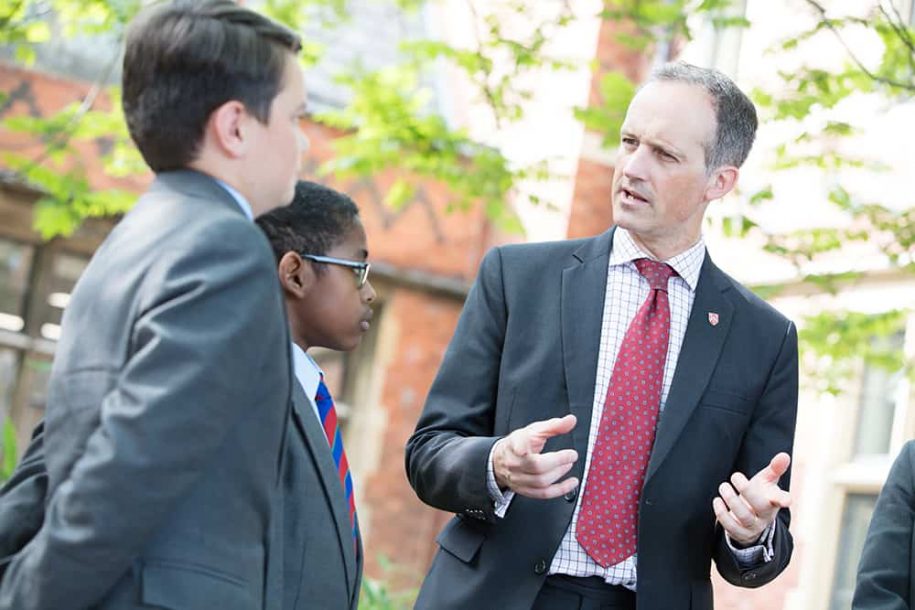A threatening world

<strong>A threatening world</strong>
For my opening assembly of term on Tuesday, I left to one side the predictable start of term topics of exam revision or new resolutions. Instead, I asked the boys to reflect on international politics. The Easter break has been a very busy time for news, and I hope that LGS boys have kept abreast of current affairs: an educated young man, after all, understands what is going on in the world around him.
I imagine that it must have been extremely disturbing for many younger boys to think that an invisible nerve agent smeared on a door handle in a British town could leave someone fighting for their life. It must have been unpleasant to hear national governments mudslinging in the media, and when it became clear that the USA, Britain and France would bomb chemical weapons sites in Syria, the threats of retaliation must have been very frightening.
The Salisbury poisonings and the war of chemical weapons, retaliatory missiles and words in Syria brought me back to my childhood during the Cold War. At the age of 12 or 13, I remember the news reports of Greenham Common protests, and worrying about how a single bomb could kill millions of people, including me. Although I had heard of the concept of ‘mutually assured destruction’ that kept an uneasy truce between the West and Russia, this was of little reassurance. In many respects, the Cold War seems to have returned and I doubt that these recent incidents will be the last points of tension between these major countries. How can we help boys to make sense of this political intrigue and the high stakes associated with it?
I think that there are a few strands worth exploring with them. Firstly we might spend some time explaining the nature of politics. Young boys tend to see life in a binary way: something is either true or untrue. “Why are the British and Russian Governments arguing about what happened in Salisbury? Surely the police can find out the truth?” In my assembly, I pointed out that absolute proof is rare, but that some people who criticize the Prime Minister’s actions want there to be absolute proof. I think that it is worth stressing that, in life, we often have to make decisions on the basis of incomplete information – on the ‘balance of probabilities’ as we might say. If we refuse to act unless we are 100% certain of our facts, we will not achieve very much.
I have said on a couple of occasions to boys in assembly that politics is not about right and wrong. Rather, it’s about persuading others that you are right. Just as Russia is using the media to persuade the world that the UK and the USA are treating it vindictively, our Prime Minister needs to find someone to blame for the Salisbury poisonings to reassure the British public that the situation is under control. She does not have absolute proof, but the fact that the rest of Europe and the Organisation for the Prohibition of Chemical Weapons are supporting her is very significant.
We might also emphasise that actions are intended to send a message about what will happen in the future if a country continues to act in the same way. Britain and its allies have made a huge fuss about the poisoning of the Skripals because they want it never to happen again. Russia is now clear that, if something similar were to take place, the international community would respond very strongly. Sending a message is also what Britain, USA and France were doing in bombing Syria a fortnight ago. The attacks were limited, and this was deliberate as the allies did not want to provoke Russia into retaliation. However, it is now clear to Syria and Russia that if another chemical attack against civilians were to take place, the response would be much larger.
Finally, it is worth reminding our sons of the unlikelihood of being caught up in any criminal or terrorist attack. Yes, we should be vigilant, but as I said to boys following the Manchester concert bombing and the London Bridge attack last summer, we should not overstate the risk of becoming victims. We cannot wrap ourselves in cotton wool and refuse to venture out because of the small risk of harm coming to us.
I hope that, if you have a worrier at home, you will be able to help him put the news into perspective. Perhaps he should concentrate instead on the thawing of tensions in North Korea where at least there is the hope of compromise making this world a safer place.
